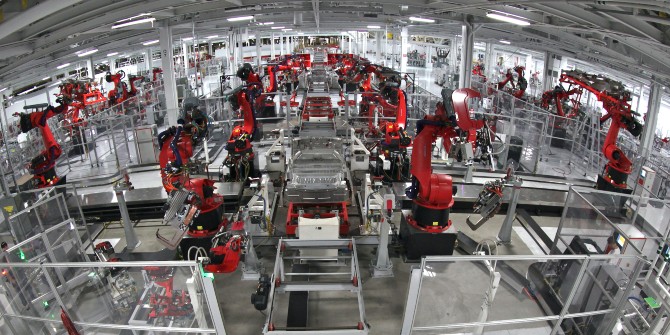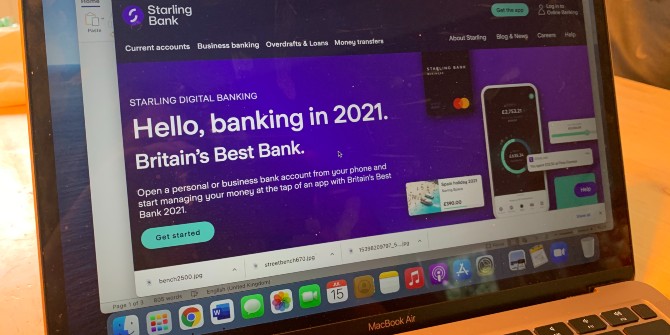Industrial policy is unfit for the new era. Riccardo Crescenzi (LSE), Jintao Zhu (LSE) and the LSE Maryam Forum Innovation and Inclusive Growth Working Group call for a new generation of evidence-based public policies to promote innovation and inclusive growth.
Geo-political fragmentation, the reorganisation of global value chains and new technologies were all happening before COVID-19, but the pandemic has accelerated them. We need a new generation of public policy to promote growth and innovation, supported by solid institutions. It must be driven by solid evidence on what works in practice, when and under what conditions. Ideology and anecdotal evidence should be replaced by robust insights on effectiveness and impact.
Many pro-recovery policy tools – for example, on innovation, health and ‘green’ – are intrinsically ‘exclusive’ in terms of their beneficiaries. We stress the importance of focusing on inclusion – highlighting gender, age and sub-national regions as key lenses, including to measure success – in the design of public policies.
Recommendation 1: Build supportive ecosystems and sound institutions to deal with crises and respond to global challenges
Both domestic and foreign investors can operate better in supportive ecosystems that can link global opportunities with local economic development. Building these ecosystems calls for a gradual approach, based on a careful diagnosis of existing bottlenecks, as well as potential solutions. It also demands a strategic understanding of the areas that will attract potential investors, and investment in the skills and incentives they want. This is especially important for developing countries that are experiencing structural transformation or have not yet discovered their comparative advantage. Investment Promotion Agencies (IPAs) can play a pivotal role if they have a focused mandate and can work in close contact with investors.
Strong institutions are not easy to build, and demand active capacity-building at the local and national levels.
Pure export-led growth strategies, based on the premise of hyper-globalisation, appear to have had their day. We need to figure out how to unlock new economic potential in countries that have traditionally been export-oriented.
Recommendation 2: Education and skills are key
Education generates skills and talent, and is the foundation of more inclusive societies. Rapid technological change will make it even more important, and governments need to support lifelong learning. Civil servants, who are dealing with increasingly complex and changing problems, need continued training and professional skills development. This will encourage more evidence-based public policy.
Recommendation 3: Digitalisation, artificial intelligence and automation should be directly integrated into public policies

Trade in goods, and the global value chains (GVCs) supporting it, was already weakening before the pandemic. A combination of the rising costs of GVCs and declining costs of automisation led to some re-shoring. COVID has reinforced these trends, but also exposed the enormous potential in cross-border trade in services with remote working. Whether this will lead to a return to globalisation – albeit modified – or to more regionalisation remains to be seen. Either way, the critical challenge is to move to a new, sustainable growth pattern that provides good jobs both in advanced and emerging countries.
In advanced countries, this may require active labour market policies and possibly employer tax incentives to avoid a net loss of jobs resulting from automisation. In emerging countries, international financial institutions should support investment in automisation to keep these countries attractive for off-shoring possibilities, even if pure export-led development strategies need to be abandoned.
Less advanced sub-national regions within all countries suffer the most from the economic contraction, and they may also struggle the most to recover and adjust to new challenges and opportunities. Dedicated regional and local policies are needed to deal with the asymmetric job impacts of digitalisation and allow less developed regions to exploit new opportunities.
Education and training systems need to be modernised so that they better complement investment in automation. Elementary education should develop creative, social and emotional skills as well as basic literacy and numeracy. Adults should be able to access training and further education to allow them to adjust to new labour market realities.
Digitalisation and fintech (e.g. blockchain) could be used to develop sustainable finance.
Recommendation 4: Expand internet access
COVID-19 has exposed the enormous premium on digital access for both households and businesses. Internet access should become a right: without it, access to basic services such as education and health are hampered and ability to work diminished. Policy should not only focus on building infrastructure, but also pay attention to individual accessibility especially for vulnerable groups and for specific categories of firms. One proposal is to subsidise the fixed investment costs of new infrastructure.
Recommendation 5: Global taxation of capital can help expand the fiscal space and create jobs
The burden of taxation falls disproportionately on labour relative to capital. This penalises employment and undermines fiscal capacity. However, increasing capital taxes at the national level is challenging. Global agreement, coordination and information sharing are urgently needed.
Changing work patterns that include remote working from abroad also suggest a need for a harmonisation of tax regimes.
Fiscal space is also needed to accommodate increased debt service (possibly even after some debt relief to the poorest countries).
Recommendation 6: Connect global savings to SMEs with innovative financial products and link them up to GVCs
Global savings have grown during the pandemic, even in an era of historically low interest rates. At the same time small and medium-sized enterprises (SMEs) are hugely constrained in their financial capacity.
Matching savings and investment is a major challenge that calls for both innovative fintech solutions and supportive institutional arrangements to manage risk. Fintech solutions leverage big data on credit risk to reduce information asymmetry problems. Private equity funds whose stocks can be pooled to trade on stock markets can help address the SME equity shortage.
This post represents the views of the author and not those of the COVID-19 blog, nor LSE.
The LSE Maryam Forum Innovation and Inclusive Growth Working Group consists of Riccardo Crescenzi, Philippe Aghion (LSE), Vince Cable, Erik Berglof (AIIB and LSE), Çağatay Bircan (EBRD), David O’Donovan (Investment Promotion Agency of Ireland), Colleen Ebbitt (EMEA at J.P. Morgan Foundation), Christian Haenen (GE Aviation), Ricardo Hausman (Harvard Kennedy School), Dax Lovegrove (Swarovski), Dalia Martin (University of Munich), Francesca Medda (UCL Institute of Finance & Technology), Piroska Nagy-Mohacsi (LSE), Daraia Taglioni (World Bank), Graeme Taylor (Syngenta), Jintao Zhu (LSE Maryam Forum Student Lead, LSE), Santana Bevacqua (LSE), Adrian Fossaceca-Cercio (LSE), Till Meissner (LSE), Martina Pardy (LSE), Gabriel Piazza (LSE), Juan Soto-Diaz (LSE).




